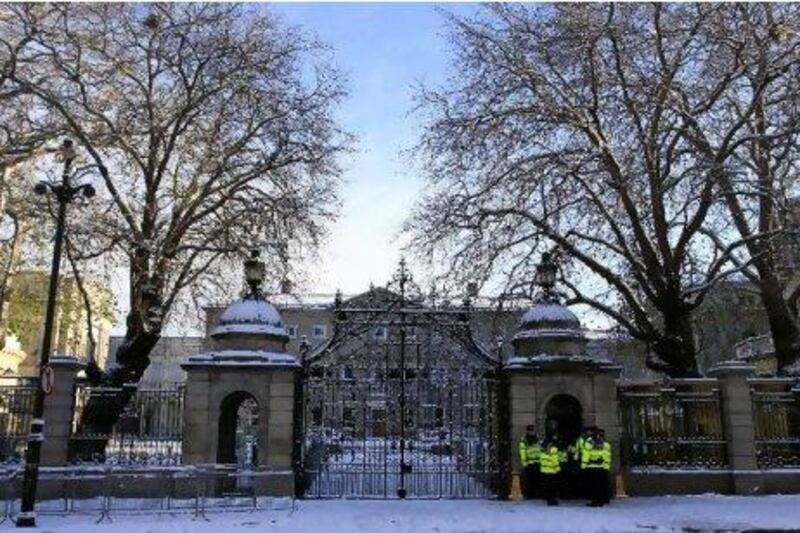Ireland has made commendable efforts to get its economy back on track after a series of struggles. Ciarán Madden, the Irish ambassador to the UAE, reveals how the recovery is faring.
Ireland has just announced a referendum on the terms of the euro-zone fiscal pact. What's the significance of this?
The attorney general has advised that, as this treaty is a unique instrument, outside the European Union treaty architecture, a referendum is required to ratify it. On foot of this advice, the government has decided to hold a referendum in which the people of Ireland will be asked to give their authorisation for the ratification of the treaty. The Irish economy is growing again, our public finances are under control and the government is using its strong political mandate to build upon this to deliver long-term, sustainable growth. The creation of stronger fiscal rules is an essential element of the steps that are needed to ensure stability, confidence and growth … in Ireland, and in the euro zone.
Irish voters have rejected European proposals at referendum in the past. How do you see this one panning out?
The government is currently putting in place the arrangements for the referendum to take place. This will include the establishment of an independent referendum commission to ensure adequate information is provided to the public. The government is confident that when the importance and merits of this treaty are communicated to the Irish people, they will endorse it emphatically by voting "yes" to continued economic stability and recovery.
The Irish government is generally held to have handled the fallout from the financial crisis pretty well in comparison to some other euro-zone countries. What's your view?
I won't compare our approach directly to that of other countries. However, I will say that we are determined to be the first EU country to exit a programme of external assistance. The crisis in Ireland has its roots in property and banking, with knock-on effects in other areas, including the public finances, credit flows to SMEs [small and medium enterprises] and employment. However, the public finances have been brought under control and the economy has returned to growth. We continue to have a strong enterprise economy, with sectors such as the medical devices industry and food exports performing well. Commentary on Ireland has moved on in the last year. Ireland's international reputation, severely damaged by the crisis, has been restored. Investor confidence in Ireland is rising, and that confidence is translating directly into FDI [foreign direct investment] and jobs. As a small country, exports have been key, and will be into the future. Exports have recovered and are now at record levels: in 2010, we exported €161 billion [Dh779.57bn] worth of goods and services, and that figure grew again last year. We have made progress, the economy is growing again and Ireland has become more competitive. Essential to the progress made has been the willingness to take tough decisions, in particular to get the public finances in order. Nobody welcomes these measures, but most recognise their necessity and accept them. Hard work and sacrifice by the Irish people have been central to the progress made.
How is the banking system holding up? Can Irish banks make use of the new LTRO [long-term refinancing operation] facilities?
As you know, the banking system in Ireland was at the centre of the crisis and was in a very bad way. However, significant progress has been made. The banking sector has consolidated. We now have fewer Irish banks. Recapitalisation was achieved ahead of time and under budget - the burden on the state has been reduced. Great strides have been made in deleveraging the banks, and that will continue this year. One measure of the progress made is that private investors have returned, with North American investors taking a major stake in Bank of Ireland in the middle of last year. Irish banks can and do make use of the new LTRO facilities, however, overall Irish use of ECB [European Central Bank] facilities has fallen at a time when other euro-zone members have drawn more heavily.
Is there any mileage to the idea of reviving the currency link with the UK?
No. Ireland's future is within the euro zone.
You are approaching the third St Patrick's Day since the embassy [in the UAE] opened. What do you think you've achieved in that time?
We have had great support from both the Irish community and the UAE Government. While starting from scratch can be difficult, with this support we have made some progress. We have seen some real, practical outcomes, such as the entry into force of a double-taxation agreement between Ireland and the UAE, and the welcome lifting of the ban on imports of Irish beef. Trade in both directions has increased. Irish political focus has been maintained on the UAE and on the region. Since the embassy opened, we have had eight ministerial visits to the UAE. With such international media focus on Ireland's problems, one challenge has been to create awareness of the strengths of the Irish economy and Irish industry. However, we have had some success in this. Most importantly, with the Irish population in the UAE now more than 5,000, I would like to think that we have been able to help and support Irish citizens resident and visiting here. That is our first priority.
twitter: Follow our breaking business news and retweet to your followers. Follow us





